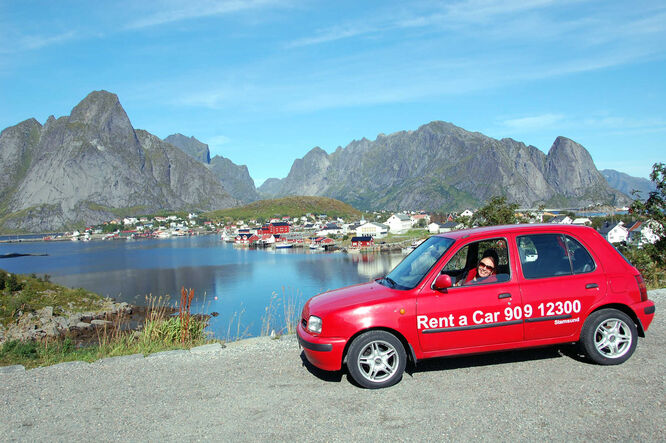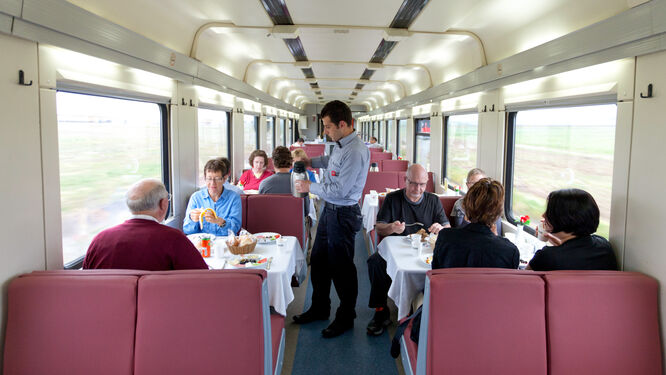Rent a Car or Take the Train?
By Rick Steves
Whether to take the train or rent a car is one of your biggest pre-trip decisions. Consider these variables when deciding whether your European experience might be better by car or train:
- Geographical range (trains cover broad area more easily)
- Rail coverage (for example, Switzerland is crisscrossed by an extensive train network, whereas Ireland's trains are sparse)
- Urban vs. rural (a car is a hassle in big cities, but helpful in the countryside)
- Number of travelers (a car can be cheaper when shared by two or more people)
- Luggage (a car is better if you're bad at packing light)
- Kids in tow (car travel is more flexible; trains allow room to roam)
Some places are easier to handle than others. The British Isles are good for driving, with reasonable rentals, no language barrier, exciting rural areas, and fine roads — and after one near head-on collision scares the bloody heck out of you, you'll have no trouble remembering which side of the road to drive on.
Other good driving areas are Scandinavia (hug the lip of a majestic fjord as you meander from village to village); Belgium and the Netherlands (yield to bikes — you're outnumbered); Spain and Portugal (explore out-of-the-way villages and hill towns); Germany (zip along wonderfully engineered freeways much loved by wannabe race-car drivers); Switzerland and Austria (drive down sunny alpine valleys with yodeling on the stereo for auto ecstasy); and Slovenia (enjoy its many diverse, picturesque sights that hard to reach by public transit).
The Case for Train Travel
The European train system shrinks what is already a small continent, making the budget whirlwind or far-reaching tour a reasonable and exciting possibility for anyone. The system is generally slick, with well-signed stations, easily accessed schedules, and efficient connections between popular destinations. First-time train travelers get the hang of it faster than they expect. For the most part, European trains go where you need them to go and are fast, frequent, and affordable. Lace this network together to create the trip of your dreams.
For many travelers, the pleasure of journeying along Europe's rails really is as good as the destination. Train travel, though not as flexible as driving, can be less stressful. On the train, you can forget about parking hassles, confusing road signs, speed limits, bathroom stops, and Italian drivers. Watch the scenery instead of fixing your eyes on the road, and maybe even enjoy a glass of the local wine. Compared to flying, rail travel allows more spontaneity. If a town looks too cute to miss, hop out and catch the next train.
It's also time-efficient, especially with Europe's ever-growing network of super-fast trains. With night trains, you can eat dinner in Munich, sleep on the train, and awaken for breakfast in Venice. And, for the most part, you don't need to show up early. As long as you're on board when the train leaves, you're on time.

As Americans, we're accustomed to being shoehorned into cramped airline seats or enduring long road trips by car. On the train, you can walk around, relax in comparatively wide seats, and enjoy a picnic onboard.
For me, trains remain the quintessentially European way to go, and the best option for romantics. Driving to the Austrian lakeside hamlet of Hallstatt is easy, but arriving by train is more memorable: Hop off at the hut-sized station across the lake, catch the waiting boat, and watch the town's shingled roofs and church spires grow bigger as the mist lifts off the water.
The Case for Car Rental
While many European travel dreams come with a clickety-clack "rhythm of the rails" soundtrack — and most first trips are best by train — you should consider the convenience of driving. Behind the wheel you're totally free, going where you want, when you want. Start your engine!
Driving is ideal for countryside-focused trips — and places accessible only by car typically have fewer tourists and more locals. If you glimpse a cute Italian hill town out the window, you can easily stop and linger. If you're exploring the lochs of Scotland, you're going to be glad you've got a car.
The mobility of a car lets you find cheaper accommodations in small towns and away from the train lines. You can also play it riskier, arriving in a town with no reservation — if the hotels are full, simply drive to the next town. And driving is a godsend for those who don't believe in packing light. For two or more people traveling together (especially families with small kids), renting a car can be easier — and cost less — than traveling by train.

